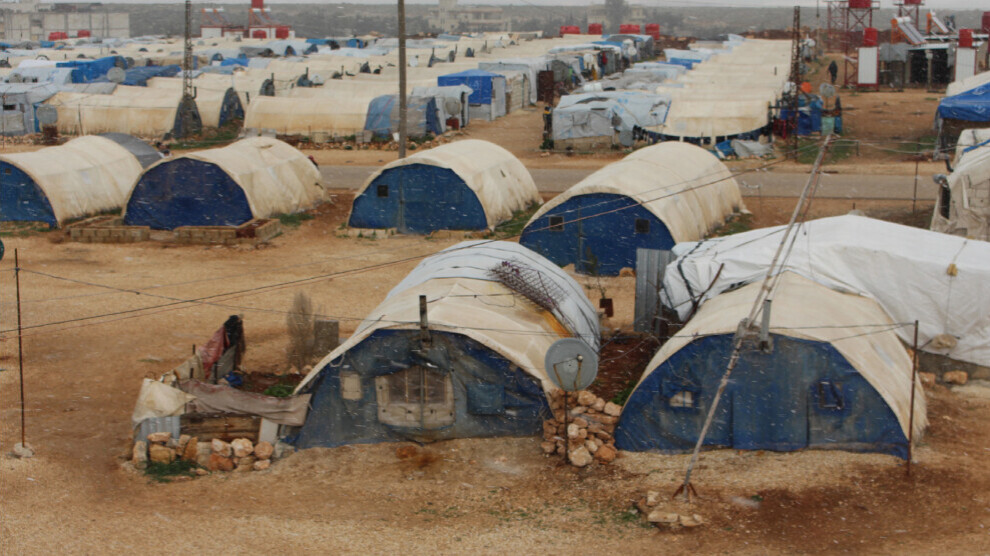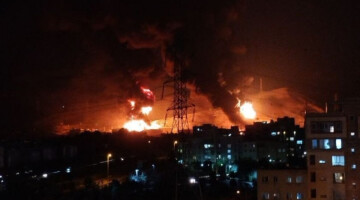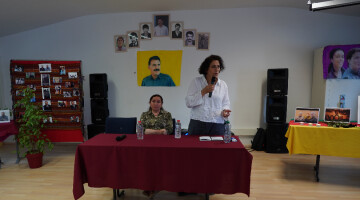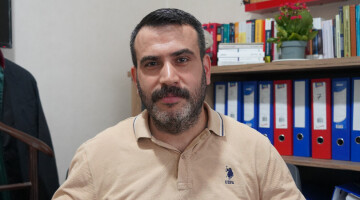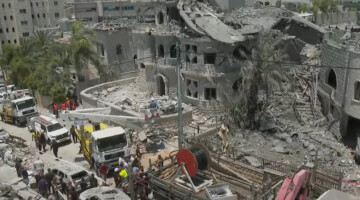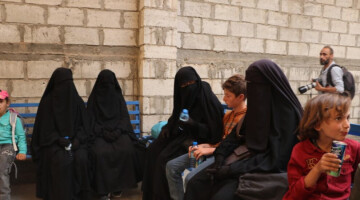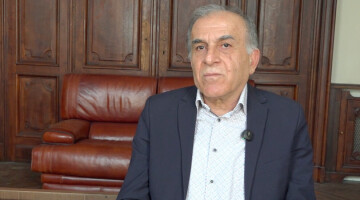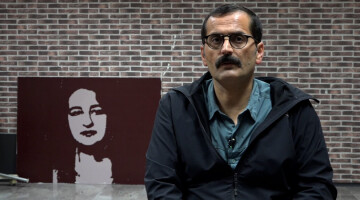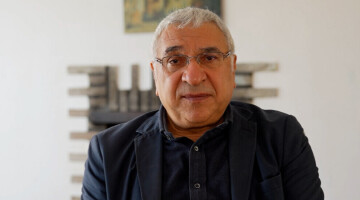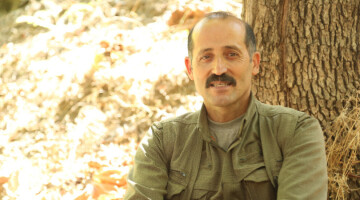The northern Syrian canton of Shehba is under an embargo by the Assad regime and Turkey. The self-governing canton is home to around 157,000 of the 300,000 people who fled Afrin after the Turkish invasion in 2018. About 10,000 of them live in camps under the most difficult conditions.
The canton of Shehba borders the Syrian governorate of Aleppo in the south. The original population of the canton, which is characterised by deserts, consisted of 90,000 people. Accordingly, there is hardly any infrastructure. The canton is part of the Autonomous Administration of North and East Syria (AANES) and receives practically no international aid. The local and regional self-government tries to provide for the isolated region with its own very limited resources. Therefore, conditions in the camps are particularly difficult for the displaced.
EMBARGO, ATTACKS AND EARTHQUAKES
The refugees in the camps of Afrin, Serdem, Shehba, Berxwedan and Veger, like the entire population of Shehba, live under hostile encirclement by the regime in Damascus and Turkey or their jihadist proxies. As a result, it is difficult to supply the region with fuel, aid and medicine. The Assad regime lets practically nothing through. The series of earthquakes since 6 February has made the situation even worse and particularly affected Shehba and Aleppo. Many buildings were already battered by the war and bombardments and collapsed. In Shehba, the situation was exacerbated by the fact that 2,205 families from Aleppo who came from Afrin had to be accommodated in the camps in Shehba after the earthquake, as they otherwise had no alternative for survival. The regime in Damascus did not lift the embargo against the self-governing districts of Sheikh Maqsoud (Şêxmeqsûd) and Ashrafiyah (Eşrefîyê) in Aleppo even after the earthquake. The same is still true for the Shehba region. Nothing is being allowed through and the Turkish state's attacks on the region, which have been going on for five years, continue uninterrupted.
SURVEY TO IDENTIFY THE MOST PRESSING PROBLEMS
The women's movement Kongra Star has launched a representative survey of 500 families randomly selected from the camps. The plan was to survey 1,000 families, but this was not possible due to the embargo. The survey focused on women and children and looked at their health and economic situation and the educational opportunities of the people in the camps. Almost all of the women interviewed live in tents with five or more people.
ECONOMIC PROBLEMS AFFECT HEALTH
About 80 percent of the women interviewed said that there were hardly any job opportunities in the vicinity of the camps. This aggravates the situation of women in particular, as the relationship of dependency on their husbands is thus reinforced. Furthermore, poverty also has a negative impact on women's health. The percentage of women who do not receive medical care despite being ill for financial reasons is 82 percent. The conditions in the camps and the embargo by the Assad regime are the main reasons for the deterioration of health care. The weather in the region is very hot in summer and very cold in winter. Due to the embargo, heating in winter is very limited, if at all, and the necessary electricity cannot be generated either. Due to the destruction caused by the Turkish attacks, the region has to rely on diesel generators, which, however, can hardly be operated due to a lack of fuel.
The lack of health facilities is a serious problem for all people in Shehba. There is a particular lack of facilities specialising in gynecology or pediatrics. Women have to make the dangerous journey to Aleppo for delivery or treatment during pregnancy. At the same time, there is also a lack of facilities for training people specialized in health care for women and children.
THE LIVING CONDITIONS OF PEOPLE WITH DISABILITIES
People with special needs, in particular, suffer from the conditions in the camps. Among the families interviewed, about ten percent are people with disabilities. There is an urgent need for care and support for children with disabilities. The lack of care exposes them, as well as their families, to great stress.
LACK OF PRIVACY AND PROBLEMS WITH HYGIENE
The participants in the survey said that the lack of privacy was one of the biggest problems in their daily lives. The reasons for this are that the tents are very close to each other and more than six people live in one tent. The women report that this is a great psychological burden for them and often even leads to depression. Although the issue of hygiene was not explicitly mentioned in the survey, almost all the women interviewed complained about such a lack. In the camps, many people live in very confined spaces and use the same toilets and washing facilities. Hygiene facilities are particularly important for women during menstruation. The lack of access to clean water, the malnutrition of children and the lack of play facilities for the children are a further psychological burden for women.
Many women complain about the feeling that they cannot raise their children well under these conditions. This leads to an increase in stress levels. All women who participated in the survey reported that they had difficulties providing their children with sufficient food. 80 per cent of the women particularly underlined the psychological consequences of not being able to properly care for their children and give them toys or spaces to play.
SHEHBA IS NOT ON THE AGENDA OF INTERNATIONAL ORGANISATIONS
Speaking about the background of the survey, Menal Mihemed from Kongra Star said: "More than five years have passed since the Turkish army invaded Afrin. The people from Afrin were forced to flee their homes and now have to live in camps in Shehba. Despite the invasion, the attacks and the displacement, international agencies and institutions are not interested in the living conditions of the people from Afrin in the five camps and do not offer any help. The people are dependent on the means of the autonomous administration. One of the most important issues in our region is to improve the living conditions of the refugees. It is about ensuring their return to their homes. But the international institutions, organisations and powers do not care about that. It is not an issue for them. We conducted this survey to give a voice to the people suffering from the embargo and the attacks, and we got a clear picture of the situation. People, especially women and children, are struggling with the biggest problems and trying to survive somehow. The damage that the health and economic conditions are doing, especially to women and children, is huge."
HARDLY ANY EXPECTATIONS LEFT OF THE INTERNATIONAL COMMUNITY
Menal Mihemed stated that Kongra Star has conducted similar surveys and studies before: "Our surveys are not just about research. The results are forwarded to women's organisations and human rights institutions in the Middle East and European countries. Information is also provided to well-known personalities who can make a difference. For us, passing on information to the international powers is not a question. Because they have not yet taken any concrete steps regarding the problems of the people, women and children living in the camps, especially in Shehba. Our main goal is to reach out to democratic and freedom-minded people, those who stand up for human rights. As Kongra Star, we see it as our duty to make the voices of our people, women and children, heard."
DISEASE PREVENTION ALMOST IMPOSSIBLE
The results of the survey were published in seven languages, said Menal Mihemed, summarising the findings as follows: "Both the living conditions in the camps and the embargo imposed by the government in Damascus contribute to the deterioration of the health situation. With many people living in a confined space, the risk of spreading infectious diseases is high and it is almost impossible to prevent this. The lack of medicines is one of the biggest problems. There are no medicines in Shehba for many diseases such as tuberculosis, heart diseases, diabetes, etc. In emergencies, people have to travel to Aleppo and pay ten times as much for medication. Most people cannot afford it."
Menal Mihemed warned that the situation for the hundreds of thousands of internally displaced people would get worse if the embargo and attacks continued, and appealed to the international community to finally take the situation seriously.

